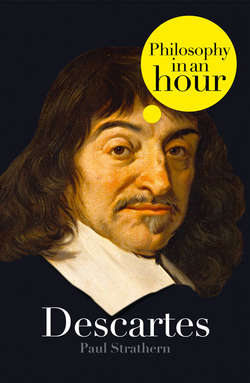Читать книгу Descartes: Philosophy in an Hour - Paul Strathern - Страница 4
Introduction
ОглавлениеBy the end of the sixteenth century, philosophy had stopped. It was Descartes who started it up again.
Philosophy had begun for the first time in the sixth century B.C. in ancient Greece. Two centuries later it entered a golden era with Socrates, Plato, and Aristotle. Then, for nearly two thousand years, nothing happened. At least, nothing original happened.
Nonetheless several distinguished philosophers appeared during this period. The third-century Alexandrian Plotinus refined Plato’s philosophy, in the process creating Neoplatonism. St. Augustine of Hippo then refined Neoplatonism to the point where it was acceptable to Christian theology. The Islamic scholar Averroës refined parts of Aristotle’s philosophy, and Thomas Aquinas in turn rendered these acceptable to Christian theology. All four of these disparate figures advanced the course of philosophy, but not one of them produced an entirely new philosophy of his own. Their work was essentially exegesis, commentary, and elaboration of the philosophy of Plato and Aristotle. In this way these two pagan philosophers (and their pagan philosophies) became pillars of the Christian church. This intellectual conjuring trick was the main foundation of Scholasticism, the name given to philosophical activity during the Middle Ages. Scholasticism was the philosophy of the church and prided itself on its lack of originality. New philosophical ideas resulted only in heresy, the Inquisition, and burning at the stake. The ideas of Plato and Aristotle gradually became buried beneath layers of religiously correct Christian commentary, and philosophy dried up.
By the mid-fifteenth century this moribund stage had been reached in almost all fields of intellectual endeavor. The church reigned supreme throughout the medieval world. But already the first cracks were beginning to appear in this vast edifice of intellectual certainty. Ironically the main source of these cracks was the same classical world that had produced Plato and Aristotle. Much learning that had been lost or forgotten during the Dark Ages now began coming to light, inspiring a renaissance (or rebirth) of human knowledge.
The Renaissance brought with it a new humanistic outlook. This was followed by the Reformation, which ended the hegemony of the church. Yet more than a hundred years after these developments had transformed Europe, philosophy remained stuck in the bog of Scholasticism. This came to an end only with the arrival of Descartes, who produced a philosophy fit for the new era. In no time this spread through Europe and even achieved the ultimate accolade of being named after its founder: Cartesianism.
